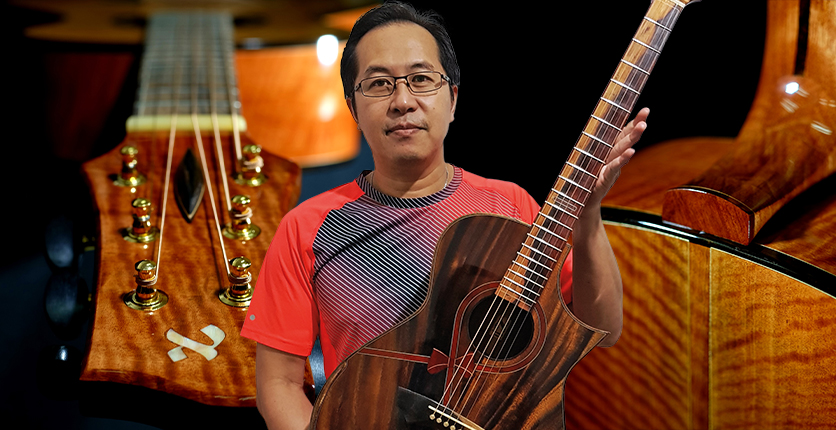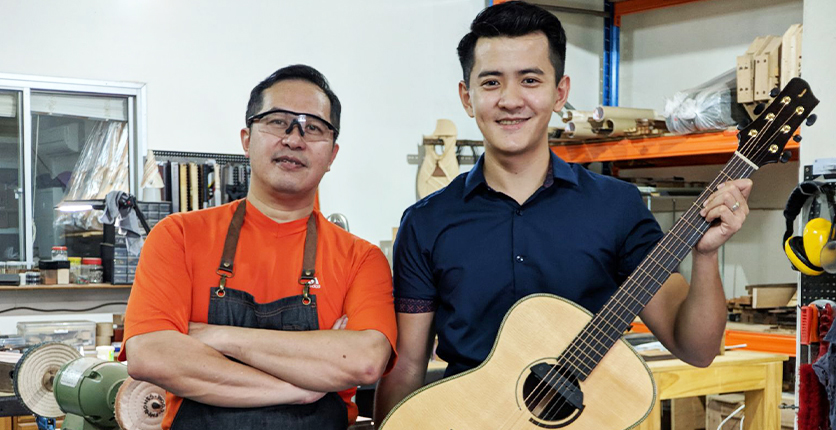There’s no room for whims and fancies, a wishy-washy attitude, and ‘Wah, no aircon and Wi-Fi ah?’” quips Adam Chan, Singapore’s very own custom guitar maker, about pursuing a metier in the name of passion.
Nevertheless, passion alone isn’t enough to succeed, he says. Chan, whose steel-string guitars come with price tags from $5,300, adds: “While my workshop was operational from 2014, it was not until 2017 that I completed my first built. I spent a few years studying steel-string guitars in the aspects of aesthetics, function and structure…”
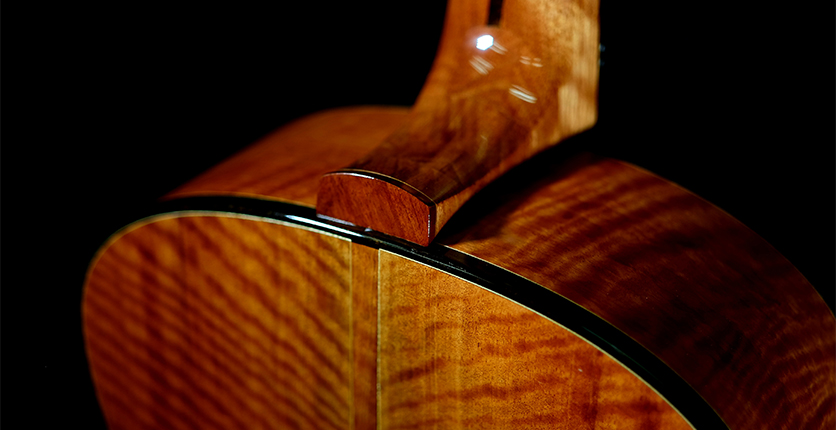
But foremost is the need to find one’s calling. “As I learnt to play steel-string guitars, I became interested in how this instrument works. Being curious by nature, I made an effort to understand string instruments in their various aspects. It was probably when all these pieces fell in place that it became clear guitar making was my calling.”
eNSMan chats with Chan to find out more about his journey of impassioned soul searching.
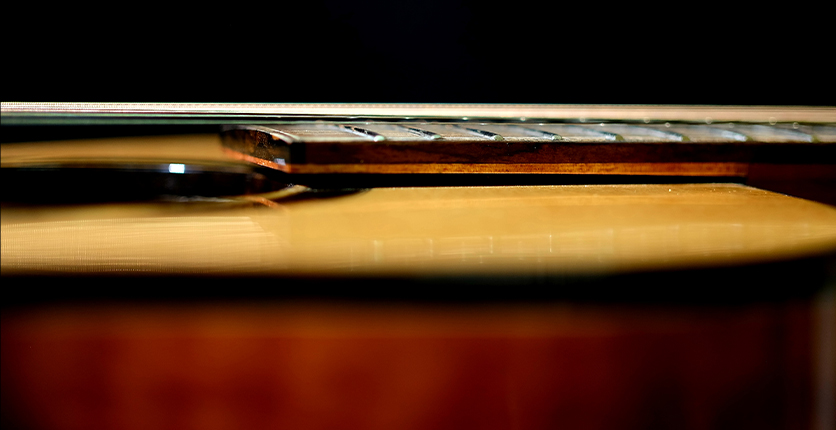
What kind of guitars do you make?
Steel-string guitars, also known as acoustic or folk guitars. Overseas customers would contact me directly via email, and local customers would drop by my workshop to try them out.
What makes a good guitar?
Objectively, one could use price as a benchmark to appraise if a guitar is indeed good. This manner of appraisal is suitable for seasoned guitar players as they are able to discern the true values that go into making a guitar – for example, in the selection of wood materials, the construction methods, complexity, and beauty of ornamental details.
Guitars of such a quality come with hefty price tags. But these attributes are not readily comprehensible to novice-to intermediate guitar players. As a guitar player “grows” from being a novice, the notion of a good guitar would also change according to his stage of growth. “The best guitar in the world” isn’t an object but a journey.
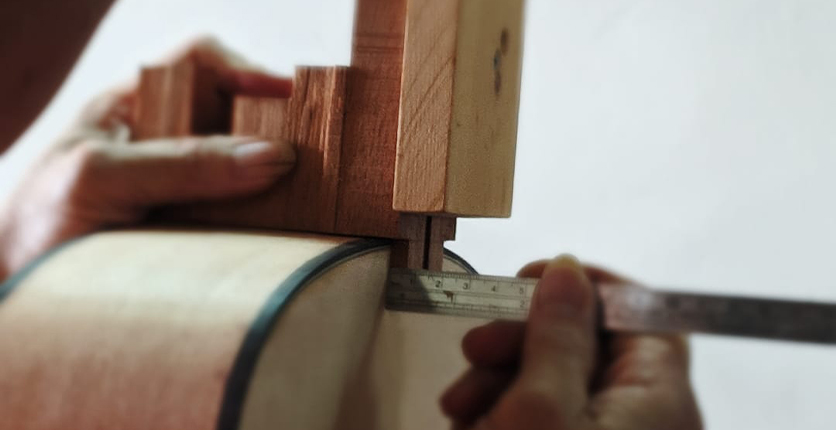
Who do you admire in the trade?
Every maker has something worthy to learn from. Invariably, I’m not saying that every guitar maker is equal in ability. In producing highly detailed fine inlay works, I would name Ervin Somogyi. In harnessing technology to attain precision, it has got to be Kevin Ryan. The master in making amazing shell inlays must be Larry Robinson. There are more. They are all noteworthy individuals who have set high benchmarks for others to emulate.
How did you make the switch from engineer to guitar artisan?
While I obtained an engineering degree, I was never into engineering jobs. I found my calling in guitar repairing and, eventually, guitar making.
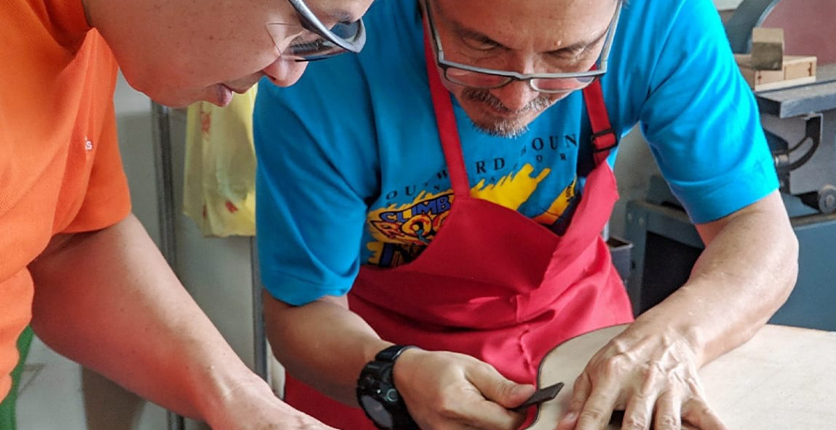
In my younger days, I used to follow my dad to his wood workshop. Watching him in action planted a seed in me. Part of my growing up years was spent in repairing and making things. The woodworks and the making of things in my youth nudged me in the direction of guitar making. However, that wasn’t enough for me to make the leap. I believed that my love for music was key. I was unable to afford a piano to express my love, so I looked for another alternative that was within my reach, and that was the steel-string guitar.
You craft guitars out of trees felled due to disease. How did that come about?
That would be the electric guitars I made for NParks Singapore. I wouldn’t call it a mantra; I was trying to contribute to the efforts by NParks to promote public awareness about Singapore’s rain trees. I suggested ideas to then-SMS Desmond Lee [now Minister of Social and Family Development] to help in the mentioned efforts. One idea begot another and, eventually, we decided to make an electric guitar out of a felled, diseased mahogany tree that once stood along Singapore’s Formula One circuit route. The completed guitar was presented to Minister Lawrence Wong during the premiere of the Singapore Garden Festival in 2016.
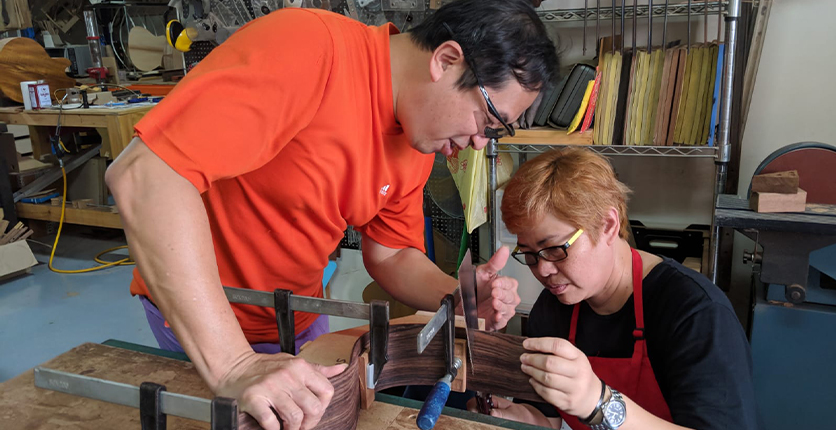
What guitar do you value the most?
It should be the unofficial first solo built in my mentor’s workshop. After I purchased several sets of guitar wood materials, I went ahead with my first “dream” guitar. With little understanding of what craftsmanship was then, my focus was on aesthetics. Every attempt was about matching the grains and making sure all observable parts were made to perfection. To cut the long story short, it was a disaster.
While the natural wood grains were very attractive, I made several major errors and a lot of smaller ones. The guitar definitely does not produce the best sound and there are obvious signs that it is the product of an untrained maker.
It was clear to me that my zeal to make my dream guitar created a disaster instead. Just because one is passionate and sincere about doing the work doesn’t mean the quality is high. This is a fallacy that is not perceived by many passionate individuals and Singaporeans. I have woken up from my slumber since.
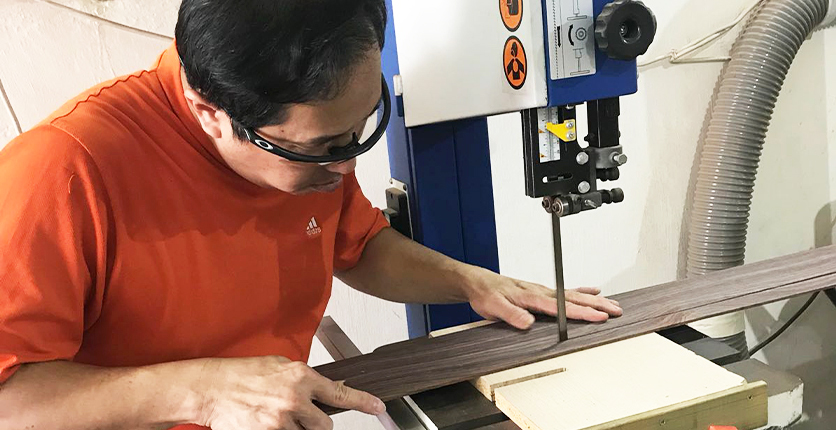
What have you learnt from your passion?
That it is not something you wish to fall back on when the going gets tough. Everything initiated from a spark of passion will quickly fade away once routine sets in. Just look at the many start-ups. Where are they now?
I opened my workshop in February 2014, but it was only after three years that the first guitar was completed in August 2017. AdamCHAN Guitars wasn’t ready before then.
There was much skills and knowledge to discover and learn in creating a brand and product that would actually mean something. Running a workshop isn’t just about passion; it’s also about sheer grit and discipline.
Besides passion, what else do you value?
Discipline has helped me to push forward even when I was fearful, and enthusiasm has allowed me to laugh at things. Talented young people think that discipline and enthusiasm are mutually exclusive, but they are not. Enthusiasm exists within discipline; and discipline, too, can be found in enthusiasm. I can’t emphasise this more.
Craftsmanship is often linked to the pursuit of technical precision and perfection. How much of a perfectionist are you?
Honest work above perfect work – I stick by this motto. In steel-string guitars, there are areas that demand precision because it could mean making a guitar that is enduring or one that has a short life span.
There are also aspects that the use of intuition and feel override the perfect ruler. If perfection doesn’t exist, it would make no sense to be a perfectionist, wouldn’t it? Craftsmanship is not the pursuit of perfection, nor is it just about technical precision. The masterpiece made by a craftsman should be as precise as it should be.
It should also communicate aesthetics to its beholders, seductively etched in their minds to the point that they have to possess the masterpiece for the itch to stop.
How important is passion in general?
Pragmatism has been deeply rooted in Singapore culture. For those who want to live their lives “abundantly”, they should have come across this fuzzy thing called passion and inadvertently would have wrestled it in their heads. If passion wins, they may one day, with discipline and enthusiasm, find their calling.
To know just the importance of passion in life is irrelevant. It is about acceptance. To accept that being alive isn’t about ticking check boxes but to take the risk, fulfil the responsibilities, acknowledge the fear, be interested, do what is necessary, make it work, to serve and not be served.
Don’t get caught up by only outcomes. That said, it’s not the same as going YOLO.
What advice do you have for Singaporeans who want to pursue their passion in life?
Use passion only to ignite. Prepare yourself for the long haul. Take discipline as your daily bread. And use enthusiasm to remind yourself that you are but human.
More reads
- Ninja Van co-founder and CEO Lai Chang Wen talks about becoming the region’s premier delivery service provider.
- After more than 20 years, student turned committee member Desmond Teo is still steadfast in his dedication to the SAFRA Photographic Club.
- Young hawkers Walter Tay and Keith Koh prefer to see the silver lining behind the tough business.
